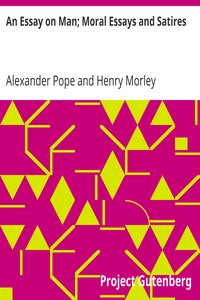An Essay on Man; Moral Essays and Satires by Alexander Pope
"An Essay on Man; Moral Essays and Satires" by Alexander Pope is a philosophical poem written in the early 18th century, engaging with profound themes of human existence and moral understanding. The work explores the nature of humanity, the universe's design, and our place within it, emphasizing that the study of mankind is of utmost importance. Through its structured verses, the poem examines concepts such as happiness, virtue, and the principles governing
social relations. At the start of this essay, Pope introduces the overarching theme of the piece by inviting a friend, Lord Bolingbroke, to explore and reflect on the human condition. He discusses the complex layers of human nature and the importance of understanding one's position in the grand schema of the universe. The opening verses set the tone for a philosophical exploration that seeks to justify the ways of God to man, while emphasizing the inherent limitations of human knowledge and understanding. Pope argues for a perspective that recognizes the interconnectedness of all beings, asserting that what may appear imperfect in man is in fact part of a greater, divine order. (This is an automatically generated summary.)
Read or download for free
| How to read | Url | Size | |||
|---|---|---|---|---|---|
| Read now! | https://www.gutenberg.org/ebooks/2428.html.images | 313 kB | |||
| EPUB3 (E-readers incl. Send-to-Kindle) | https://www.gutenberg.org/ebooks/2428.epub3.images | 212 kB | |||
| EPUB (older E-readers) | https://www.gutenberg.org/ebooks/2428.epub.images | 213 kB | |||
| EPUB (no images, older E-readers) | https://www.gutenberg.org/ebooks/2428.epub.noimages | 186 kB | |||
| Kindle | https://www.gutenberg.org/ebooks/2428.kf8.images | 483 kB | |||
| older Kindles | https://www.gutenberg.org/ebooks/2428.kindle.images | 453 kB | |||
| Plain Text UTF-8 | https://www.gutenberg.org/ebooks/2428.txt.utf-8 | 282 kB | |||
| Download HTML (zip) | https://www.gutenberg.org/cache/epub/2428/pg2428-h.zip | 209 kB | |||
| There may be more files related to this item. | |||||
Similar Books
About this eBook
| Author | Pope, Alexander, 1688-1744 |
|---|---|
| Editor | Morley, Henry, 1822-1894 |
| Title | An Essay on Man; Moral Essays and Satires |
| Note | Wikipedia page about this book: https://en.wikipedia.org/wiki/An_Essay_on_Man |
| Credits | Transcribed from the 1891 Cassell & Company edition by Les Bowler |
| Reading Level | Reading ease score: 74.3 (7th grade). Fairly easy to read. |
| Language | English |
| LoC Class | PR: Language and Literatures: English literature |
| Subject | English poetry -- 18th century |
| Category | Text |
| EBook-No. | 2428 |
| Release Date | Dec 1, 2000 |
| Most Recently Updated | May 8, 2025 |
| Copyright Status | Public domain in the USA. |
| Downloads | 1555 downloads in the last 30 days. |
| Project Gutenberg eBooks are always free! | |

